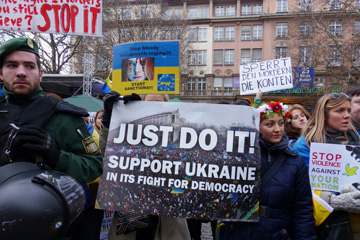
04/03/2015
In America, all eyes are drawn over and over to news about war, famine, ecological catastrophe and acts of inhumanity that currently engulf large swaths of the world.
SUNY Cortland students will have an opportunity to gain an understanding of the complex, but critical, events that dominate the headlines. The College is hosting “Global Crises Week,” a series of lectures and events that began on April 6 and continue through Thursday, April 9. The events explore crises ranging from the human causes of the world’s current ecological upheaval to bloody conflicts in the Ukraine and the rise of the violent Islamic State group.
Sponsored primarily by the Clark Center for International Education and the international honor society Phi Beta Delta, the programs are free and open to the public.
“This week we will tackle environmental and sustainability crises, the major current violent conflicts in the world and lessons learned from a crisis of the past,” said Alexandru Balas, director of SUNY Cortland’s Clark Center for International Education and coordinator of its International Studies Program.
“We think that it is important for the campus and the larger Cortland community to explore, from an academic perspective, some of the ongoing global events which are in the news headlines,” he said. “To give a global perspective on these crises, we will have speakers from different departments at SUNY Cortland, but also guests from Ithaca College and — via SUNY Center for Collaborative Online International Learning online technology — from Zirve University in Gaziantep, Turkey, just a stone’s throw away from Syria.”
The events continue on Tuesday, April 7, with the College’s yearlong “Rubble Films: Classics of Post-1945 European Cinema” series. The feature picture will also serve as SUNY Cortland’s annual Holocaust Memorial Event. The 1997 film, “The Long Way Home,” begins at 7 p.m. in Sperry Center, Room 104. Written and directed by Mark Jonathan Harris, the Academy Award-winning movie tells the story of the post World War II Jewish refugee situation from liberation to the establishment of the modern state of Israel. The documentary features Morgan Freeman, Edward Asner and Sean Astin.
On Wednesday, April 8, SUNY Cortland sociologist William Skipper will take a look at how human activity has created the ecological crisis that the planet faces today. This activity can include technologies as well as economic, political and socio-cultural systems and processes.
Skipper, a SUNY Cortland assistant professor of sociology/anthropology, will present “Livable World/Livable Planet: The Social Aspects of Ecological Sustainability” beginning at 4:30 p.m. in Moffett Center, Room 2125. A reception will precede his presentation at 4 p.m. in the Rozanne M. Brooks Museum, Moffett Center, Room 2126. His lecture continues the 2014-15 Rozanne M. Brooks Lecture Series, which is themed “Culture, Technology and Sustainability.”
On Thursday, April 9, Ithaca College Professor of History Zenon Wasyliw will discuss “The Ukrainian Revolution of Dignity and Ukraine’s Far East” at 4:30 p.m. in Brockway Hall, Jacobus Lounge. Wasyliw, who also coordinates his college’s social studies teacher education program, joined Ithaca College’s faculty in 1989. He wrote published articles in the areas of Soviet, Ukrainian and global history as well as social studies teaching pedagogy. He holds bachelor’s, master’s and doctoral degrees from Binghamton University.
Also on Thursday, April 9, a panel will present the “ISIS Forum: a State of Crisis” at 7 p.m. in Brockway Hall Jacobus Lounge. The forum will examine many aspects of the Islamic State of Iraq and Syria (ISIS), also known as the Islamic State of Iraq and the Levant. Topics will include what a caliphate is in historical terms; how the term relates to what ISIS wishes to establish in the modern day Middle East; how ISIS arose; how it acquired fighters; what is its current status in terms of control of territories; why the group destroys objects of art; whether or not this destruction of art amounts to war crimes; and what impact ISIS has had on surrounding nations in the Middle East.
The forum speakers will include Balas; Sharon Steadman, a SUNY Cortland professor of sociology/anthropology and representative of the Asia-Middle Eastern Studies Committee; Benjamin DeLee, a SUNY Cortland assistant professor of history; and Andreas Kotelis, a faculty member at Zirve University in Gaziantep, Turkey.
Born in Greece, Kotelis has a doctorate in political science from Bilkent University in Ankara, Turkey; a master’s degree in conflict resolution and analysis from Sabanci University in Istanbul, Turkey; and a bachelor’s degree in Balkan, Slavic and oriental studies from University of Macedonia, Economic and Social Sciences in Thessaloniki, Greece.
The “Global Crises Week” series also is supported by the Asia-Middle Eastern Studies Committee; the Project on Eastern and Central Europe; the Political Science Department; the Center for Ethics, Peace, and Social Justice; the Center for Gender and Intercultural Studies; and the History Department.
For more information, contact Balas at [email protected] or 607-753-2250.